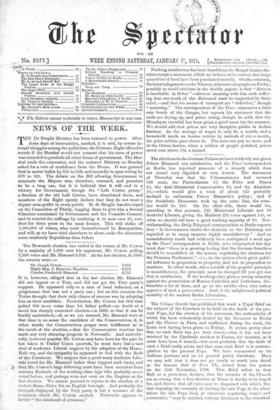The Newcastle election has ended in the return of Mr.
Cowen .4ay a majority of 1,003 over his opponent, Mr. Cowen polling 7,356 votes and Mr. Hamond 6,353. At the last election, in 1868, the returns were :—
Sir Joseph Cowen 7,057 • Right Hon. J. Emerson Headlem 6,674 Charles Frederick Hamond 2,725
It is, however, alleged that at the last election Mr. Hamond did not appear as a Tory, and did not get the Tory party's uupport. Ile appeared only as a man of local influence, on a -programme that was not a party one ; but on this occasion the Tories thought that their only chance of success was by adopting him as their candidate. Nevertheless, Mr. Cowen has this time -polled 300 more votes than his father polled—no doubt at a much less sharply contested election—in 1868, so that it can be hardly maintained,—if, as we are assured, Mr. Hamond were at -that time in no sense the candidate of the Conservatives, if, in other words, the Conservatives proper were indifferent as to the result of the election,—that the Conservative reaction has made any very alarming progress in Newcastle. And undoubt- • edly, however popular Mr. Cowen may have been for the part he hiss taken in Trades' Union quarrels, he must have lost a vast -deal of moderate Liberal support by his adoption of the Home- Rule cry, and the sympathy he appeared to feel with the Reds .of the Continent. We suspect that a good many moderate Libe- ' rals voted for Mr. Hamond rather than iupport such views, and 4 -that Mr. Cowen's large following must have been recruited from -extreme Radicals of the working-class type who probably never -voted before, and perhaps were not even on the Register at the last election. We cannot pretend to rejoice in the election of a
• violent-Home-Ruler for an English borough. And probably the strength displayed by the Tory party is but a measure of the resistance which Mr. Cowen excited. Newcastle appears to favour "the falsehood of extremes."


































